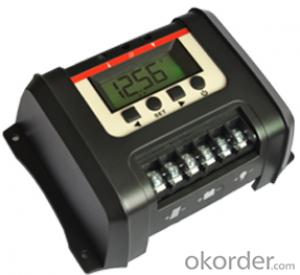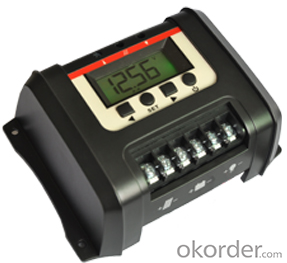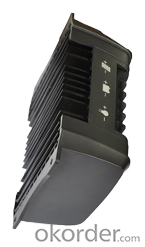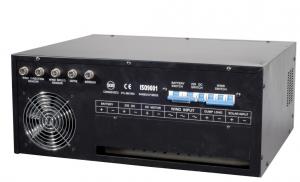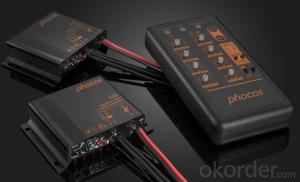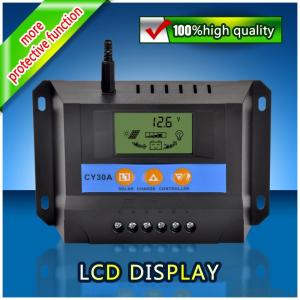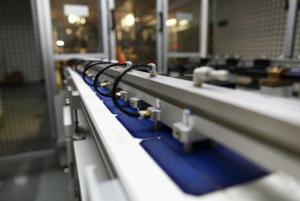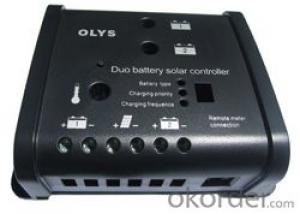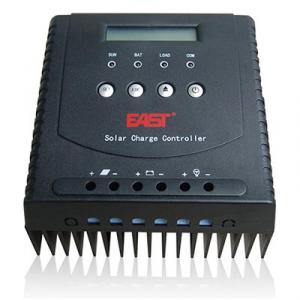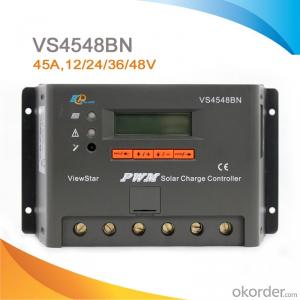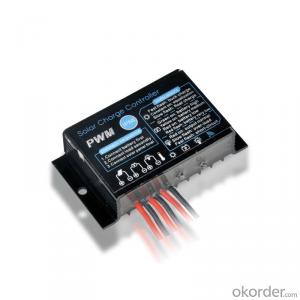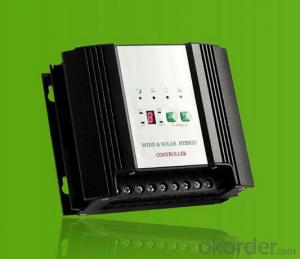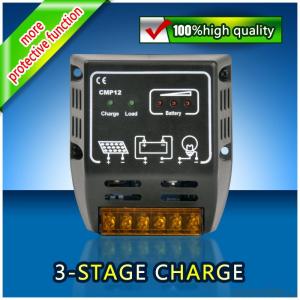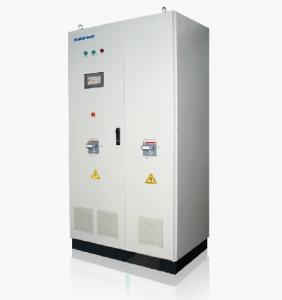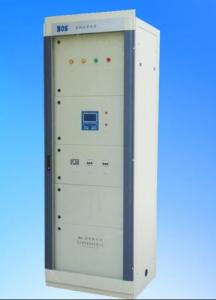Xw Solar Charge Controllers with LCD Display
- Loading Port:
- Shekou
- Payment Terms:
- TT OR LC
- Min Order Qty:
- 50 unit
- Supply Capability:
- 100000 unit/month
OKorder Service Pledge
OKorder Financial Service
You Might Also Like
1. The charge controller automatically recognize 12V or 24V system.
2. Mainly suitable for small off-grid solar power system, for example: home solar power systems, ships, self-service base stations, outposts, etc.
3. LCD display various parameters of charge and discharge.
4. Boost charge voltage and battery low voltage protection point can be adjustable 5. The three-stage PWM charging mode
6. Load output can be manually controlled。
7. With high-precision temperature compensation function.
8. With electronic protection
Technical Data
| MODEL | SNC10 SNC20 SNC30 SNC40 |
| Max.solar panel current | 10A 20A 30A 40A |
| Max. load current | 10A 20A 30A 40A |
| NO-load current | 10MA |
| Overvoltage protection | 15.5V(12V), 31V/24V; |
| Work temperature range: | -35℃--+55℃ |
| Boost voltage | 14.6V(12V), 29.2V/(24V) |
| Equalization voltage | 14.8V(12V), 29.6/(24V) |
Float voltage | 13.8V(12V), 27.6V/(24V) |
Recharge voltage | 13.2V(12V); 26.4/(24V); |
Temperature compensation | -5mv/℃/2V |
Low-voltage disconnect | 11V(12V); 22/24V; |
Load reconnect voltage | 12.6V(12V), 25.2/24V |
Charge control mode | PWM |
diplay mode | LCD |
- Q: What is the role of a solar controller in preventing battery self-discharge?
- The role of a solar controller in preventing battery self-discharge is crucial and multifaceted. A solar controller, also known as a charge controller or regulator, acts as an intermediary between the solar panels and the battery bank in a solar power system. Its main function is to regulate the amount of charge flowing from the solar panels to the batteries, ensuring that the batteries are charged efficiently and effectively. One of the key reasons a solar controller helps prevent battery self-discharge is by implementing a mechanism known as a "low voltage disconnect." This feature monitors the battery voltage and automatically disconnects the battery from the solar panels when the voltage drops below a certain threshold. By preventing the battery from discharging beyond a safe level, the solar controller helps to protect the battery from damage and prolong its lifespan. Additionally, a solar controller also plays a critical role in preventing overcharging of the batteries. When the solar panels produce more energy than the batteries can handle, the excess energy can cause the batteries to overheat and potentially lead to their failure. The solar controller prevents this by regulating the charging process, ensuring that the batteries receive only the appropriate amount of charge based on their capacity and state of charge. Furthermore, a solar controller often incorporates a feature called "pulse width modulation" (PWM) or "maximum power point tracking" (MPPT). These technologies optimize the energy transfer from the solar panels to the batteries by adjusting the voltage and current levels to match the battery's requirements. This helps to maximize the charging efficiency and minimize any energy losses, ultimately reducing the chances of battery self-discharge. In summary, the role of a solar controller in preventing battery self-discharge is to regulate the charging process, protect the batteries from overcharging and overheating, and optimize the energy transfer from the solar panels. By performing these functions, the solar controller helps to ensure that the batteries remain charged, healthy, and ready for use, thereby preventing self-discharge and maximizing their performance and lifespan.
- Q: Can a solar controller be connected to multiple solar panels?
- Yes, a solar controller can be connected to multiple solar panels. By connecting multiple solar panels in parallel or series, the solar controller can effectively manage and regulate the charging of the combined solar energy generated by all the panels.
- Q: Can a solar controller be used with a solar-powered wind turbine?
- Yes, a solar controller can be used with a solar-powered wind turbine. A solar controller is designed to regulate and optimize the charging of batteries from solar panels. In the case of a solar-powered wind turbine, the solar controller can be used to manage the charging of batteries when the wind is not generating enough power. This helps to ensure efficient energy storage and utilization, maximizing the overall efficiency of the system.
- Q: Can a solar controller be used with a solar-powered electric gate?
- Yes, a solar controller can be used with a solar-powered electric gate. The solar controller is responsible for regulating the flow of electricity from the solar panels to the gate's battery or power system. It helps to ensure that the gate receives a consistent and optimal amount of power from the solar panels, allowing it to operate efficiently and effectively.
- Q: How does a solar controller handle battery maintenance charging?
- A solar controller handles battery maintenance charging by regulating the flow of electricity from the solar panels to the battery. It ensures that the battery is charged to its optimal voltage level without overcharging or damaging it. The controller monitors the battery's state of charge and adjusts the charging current accordingly, helping to prolong the battery's lifespan and maintain its performance.
- Q: Can a solar controller be used with a solar-powered pool heater?
- Yes, a solar controller can be used with a solar-powered pool heater. A solar controller helps regulate and optimize the flow of energy from the solar panels to the pool heater, ensuring efficient heating and temperature control. It allows for better monitoring and adjustment of the solar system, maximizing the effectiveness of the pool heater and overall energy savings.
- Q: Can a solar controller be used with solar-powered gate openers?
- Solar-powered gate openers can utilize a solar controller, which plays a crucial role in optimizing and regulating battery charging from solar panels. Solar controllers are essential components in any solar power system, as they effectively manage electricity flow from the panels to the battery. By doing so, they ensure efficient battery charging and prevent overcharging and over-discharging, thus prolonging the battery's lifespan. Therefore, it is highly advisable to incorporate a solar controller into a solar-powered gate opener system to guarantee its proper operation and long-term functionality.
- Q: Can a solar controller be used in a residential solar system?
- Yes, a solar controller can be used in a residential solar system. A solar controller is an essential component that regulates the charging and discharging of batteries in a solar system, ensuring optimal performance and protection. It helps prevent overcharging and over-discharging of batteries, thus increasing their lifespan. Therefore, a residential solar system can greatly benefit from the use of a solar controller.
- Q: Can a solar controller be used with a solar-powered museum or gallery?
- Yes, a solar controller can be used with a solar-powered museum or gallery. A solar controller is an essential component of a solar power system that manages the flow of energy between the solar panels, batteries, and electrical loads. It helps regulate the charging and discharging of batteries, ensuring optimal performance and preventing overcharging or damage. In a solar-powered museum or gallery, a solar controller would play a crucial role in maintaining a stable and efficient power supply, maximizing the utilization of solar energy, and ensuring the longevity of the system.
- Q: Can a solar controller be used with different types of solar panel shading systems?
- Yes, a solar controller can be used with different types of solar panel shading systems. The main function of a solar controller is to regulate and optimize the charging of batteries from solar panels. It does not depend on the type of shading system being used. As long as the solar panels are connected to the solar controller, it can efficiently manage the charging process regardless of the shading system in place.
Send your message to us
Xw Solar Charge Controllers with LCD Display
- Loading Port:
- Shekou
- Payment Terms:
- TT OR LC
- Min Order Qty:
- 50 unit
- Supply Capability:
- 100000 unit/month
OKorder Service Pledge
OKorder Financial Service
Similar products
Hot products
Hot Searches
Related keywords
